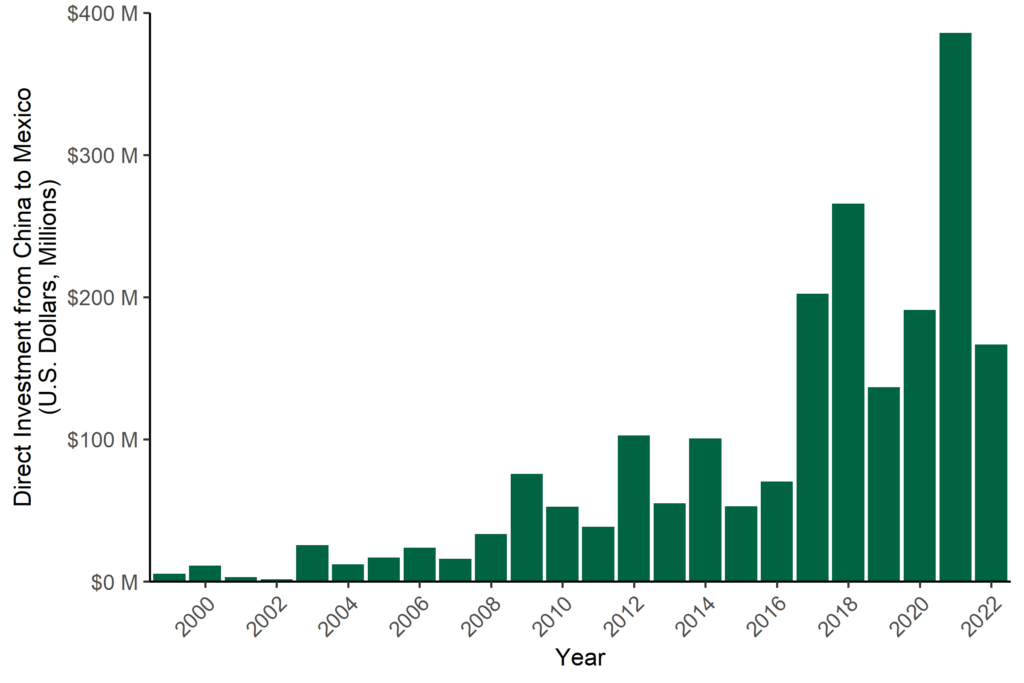Key Points
- Products manufactured in Mexico contain an increasing amount of Chinese value. Foreign direct investment by Chinese firms in Mexico is up 276%, averaging $225 million annually, compared to investment prior to the U.S. imposition of Section 301 tariffs on Chinese goods.
- Chinese investment in Mexico means manufactured goods in Mexico will contain an increasing share of Chinese components, potentially violating USMCA regional content rules.
- Growing Chinese presence in the Mexican economy raises the likelihood of transshipment of goods labeled “Made in Mexico” that are entirely or primarily “Made in China.”
- Executives of Chinese firms have admitted Mexican investment is partly driven by a desire to avoid U.S. tariffs. This likely costs the Treasury hundreds of millions of dollars annually.
Introduction
Chinese companies are increasingly investing in manufacturing output in Mexico to obtain duty-free access to the U.S. market and evade tariffs. According to Mexico’s Secretariat of Economy, investment from China to Mexico has increased to about $225 million annually, nearly quadrupling the average annual investment from the decade prior from 2007 to 2016. In 2021, Chinese investment in Mexico reached a historic high of $385 million. The increase of foreign direct investment corresponds with the levy of Section 301 tariffs by the Trump administration on Chinese imports.
FIGURE 1: Foreign Direct Investment from China to Mexico (1999-2022)
 Source: Mexico Secretariat of Economy
Source: Mexico Secretariat of Economy
Chinese Investment in Mexico Amounts to Tariff Evasion
Mexico is an attractive economy for foreign manufacturing geared for export to the U.S. as it has duty-free access to the U.S. market and comparably cheap labor costs. The recent investments include auto-parts, electronics, and furniture. As an executive of one Chinese company that located a manufacturing base in Mexico explained, “if you want to do good business with America, you must have something close to the market.” Such investment decisions are not by coincidence as Chinese executives have openly admitted they’ve shifted manufacturing to Mexico to avoid paying the tariffs of 25% they’d otherwise face by manufacturing in China. One Mexican investment executive acknowledged that the Section 301 tariffs led to a flow of Chinese capital into Mexico, “it was not common for us to help Chinese companies. But after the tariffs were imposed by the U.S. government to China in 2018, a lot of Chinese companies started to knock on the door.”
Under the United States–Mexico–Canada Agreement (USMCA), the regional value content (RVC) of a non-textile, non-automotive good must meet the threshold of at least 50% of its content sourced from the North American continent in order to receive the duty-free benefits of the agreement. But customs officials normally rely on the calculations of RVC made by the producer or exporter.
According to reports, the Chinese building wave in Mexico includes entire industrial parks to host Chinese companies. Hofusan Industrial Park, about 25 miles north of Monterrey, is a converted 2,100 acre ranch that is home to manufacturing plants for ten Chinese companies amounting to $1 billion of investment over the past three years. The industrial park is expected to grow to thirty-five businesses over the next two years and have as many as 15,000 workers when at full capacity, more than half the size of the nearest town of Salinas Victoria.
An executive for Hisense, which invested $260 million in a manufacturing plant for refrigerators in 2021 at Hofusan, remarked that his company “had all the benefits under the free trade agreement” due to its product being manufactured in Mexico.
Chinese firms are well known for using transshipment to penetrate the U.S. market in spite of U.S. efforts to stop the practice. In December, the Department of Commerce found that to avoid tariffs on Chinese solar panels, Chinese companies were manufacturing solar cells and modules in China and then shipping them to Southeast Asian countries for “minor processing before being exported to the United States. Such actions amount to an effort to evade the existing antidumping duty.”
Greater enforcement of the content and source of the components of manufactured goods coming from Mexico is greatly needed. The U.S. Trade Representative (USTR) has to authority to initiate requests to investigate suspected transshipment. In its 2022 Trade Enforcement Priorities Report the USTR laid out one such case of enforcing USMCA in the case of potential transshipment via Mexico of timber forested in Colombia.
There have been many cases involving steel where duties on Chinese steel led to steel coming from other countries like Vietnam where there was not one steelmaking furnace in the country.
Is “Friendshoring” Workable?
The increase of investment in Mexico as a manufacturing hub geared toward export to the U.S. market is advocated by some as “nearshoring” or “friendshoring” to America’s benefit. Advocates for readjusting supply chains that rely on friend-shoring, such as Treasury Secretary Janet Yellen, argue that it makes supply chains more resilient and less reliant on potential geo-political adversaries.
However, relationships between allies include a complex mix of cooperation, competition, and conflicting national interests. In the case of trade relationships, friendshoring creates the opportunity for exploitation by the very countries the U.S. is attempting to de-couple from. In the absence of capital controls by Mexico on foreign investment, preferential treatment of goods imported from Mexico incentivizes firms in other countries such as China to invest in manufacturing – or transshipment infrastructure – in Mexico in order to exploit the USMCA’s preferential tariff treatment of goods that allegedly meet regional content values.
More Enforcement of North American Content Rules Needed
Actual and potential transshipment by Chinese firms through Mexico should be taken seriously as they continue to increase investment of manufacturing and warehousing while openly admitting investment decisions are driven by tariff evasion motives. CBP should use the enforcement mechanisms at its disposal to monitor goods that receive preferential treatment under USMCA.












